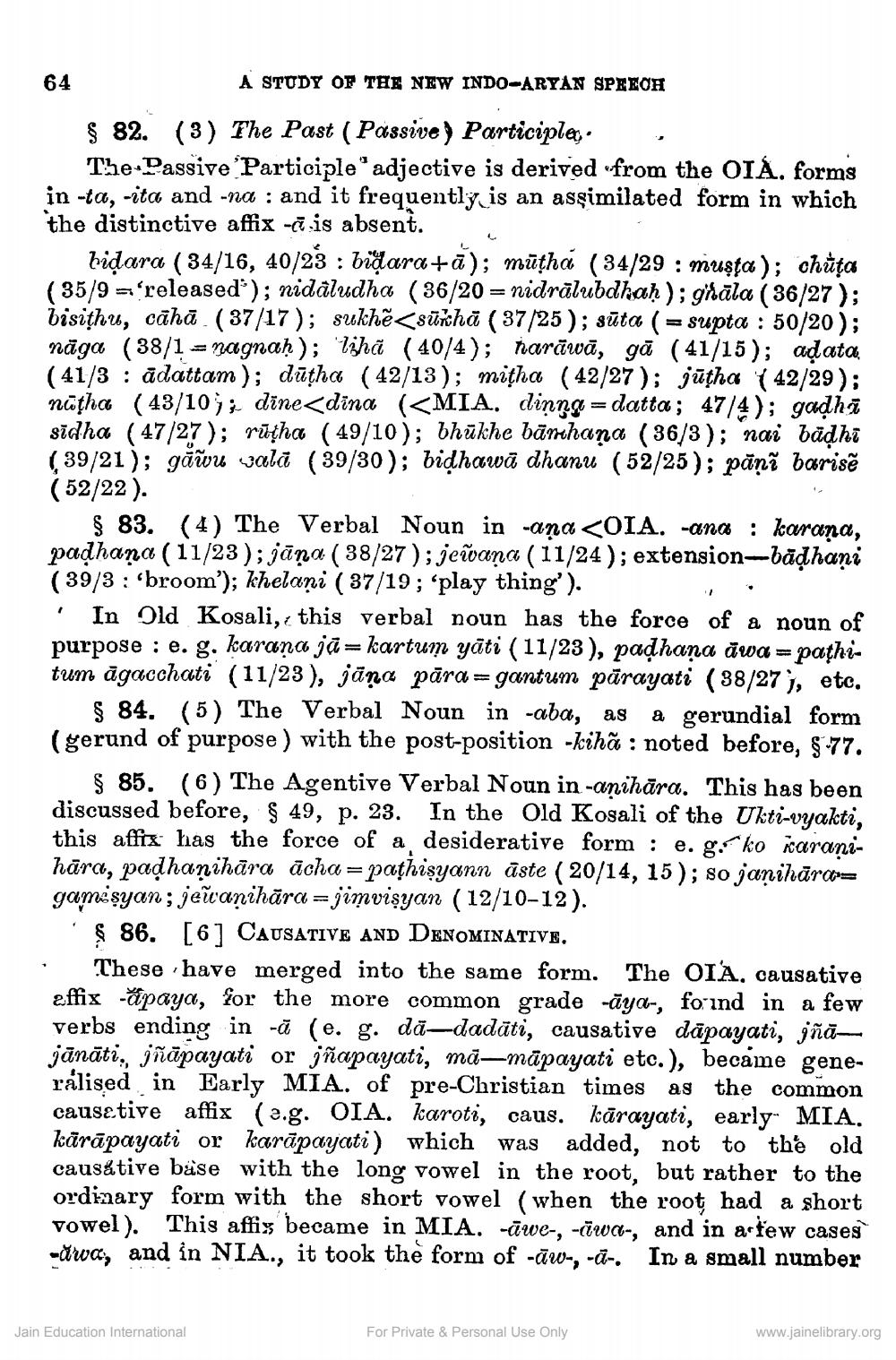________________
64
§ 82. (3) The Past (Passive) Participle
The Passive Participle" adjective is derived from the OIÁ. forms in -ta, -ita and -na: and it frequently is an assimilated form in which the distinctive affix - is absent.
A STUDY OF THE NEW INDO-ARYAN SPEECH
biḍara (34/16, 40/23 : biḍara+ā); mūṭha (34/29 : musta); chuṭa (35/9='released'); nidaludha (36/20 = nidrālubdkaḥ); ghala (36/27); bisithu, caha (37/17); sukhẽ<sūkhā (37/25); sūta (= supta: 50/20); naga (38/1-nagnaḥ); liha (40/4); harāwā, gā (41/15); aḍata (41/3 adattam); dutha (42/13); mitha (42/27); jutha (42/29); natha ( (43/10); dinedina (<MIA. dinng=datta; 47/4); gaḍha sidha (47/27); rutha (49/10); bhukhe bämhana (36/3); nai baḍhi (39/21); gawu sala (39/30); biḍhawa dhanu (52/25); pani barisẽ (52/22).
§ 83. (4) The Verbal Noun in -ana <OIA. -ana: karana, padhana (11/23); jāņa (38/27); jewana (11/24); extension-bāḍhani (39/3: 'broom'); khelani (37/19; 'play thing').
1
In Old Kosali, this verbal noun has the force of a noun of purpose e. g. karana jā= kartum yāti (11/23), paḍhana awa=pathitum agacchati (11/23), jāņa pāra = gantum parayati (38/27), etc. 84. (5) The Verbal Noun in -aba, as a gerundial form (gerund of purpose) with the post-position -kiha: noted before, §77.
§ 85. (6) The Agentive Verbal Noun in -aṇihara. This has been discussed before, § 49, p. 23. In the Old Kosali of the Ukti-vyakti, this affix has the force of a desiderative form e. g. ko karanihara, paḍhanihara acha-pathisyann aste (20/14, 15); so janihāra= gamesyan; jeuanihāra =jimvisyan (12/10-12).
$86. [6] CAUSATIVE AND DENOMINATIVE.
These have merged into the same form. The OIA. causative affix apaya, for the more common grade -aya-, forind in a few verbs ending in -a (e. g. da-dadāti, causative dapayati, jñājānāti, jñāpayati or jñapayati, ma-mapayati etc.), became generalised in Early MIA. of pre-Christian times as the common causative affix (e.g. OIA. karoti, caus. karayati, early MIA. kārāpayati or karapayati) which was added, not to the old causative base with the long vowel in the root, but rather to the ordinary form with the short vowel (when the root had a short Vowel). This affix became in MIA. -awe-, -wa-, and in a few cases -dwa, and in NIA., it took the form of -aw-, -ā-. In a small number
Jain Education International
For Private & Personal Use Only
www.jainelibrary.org




